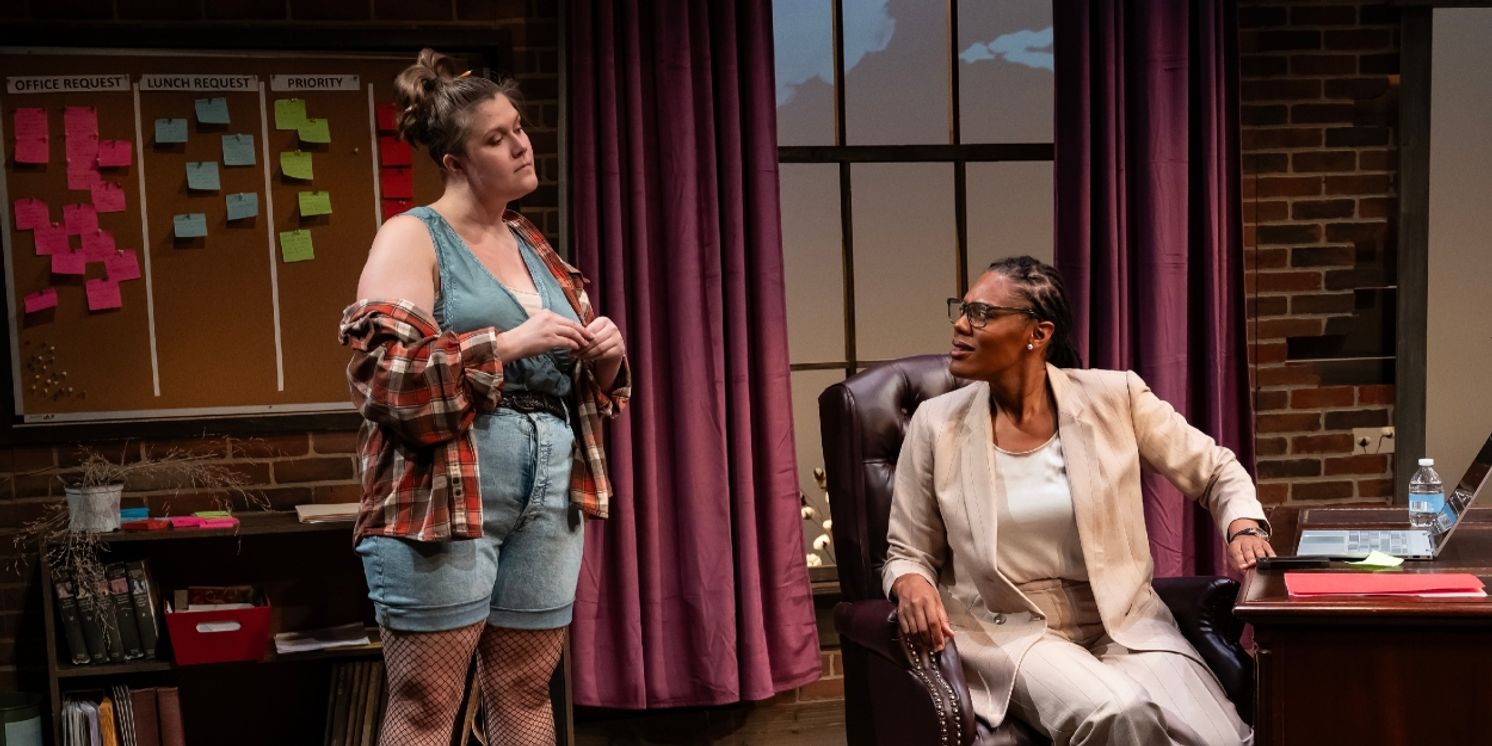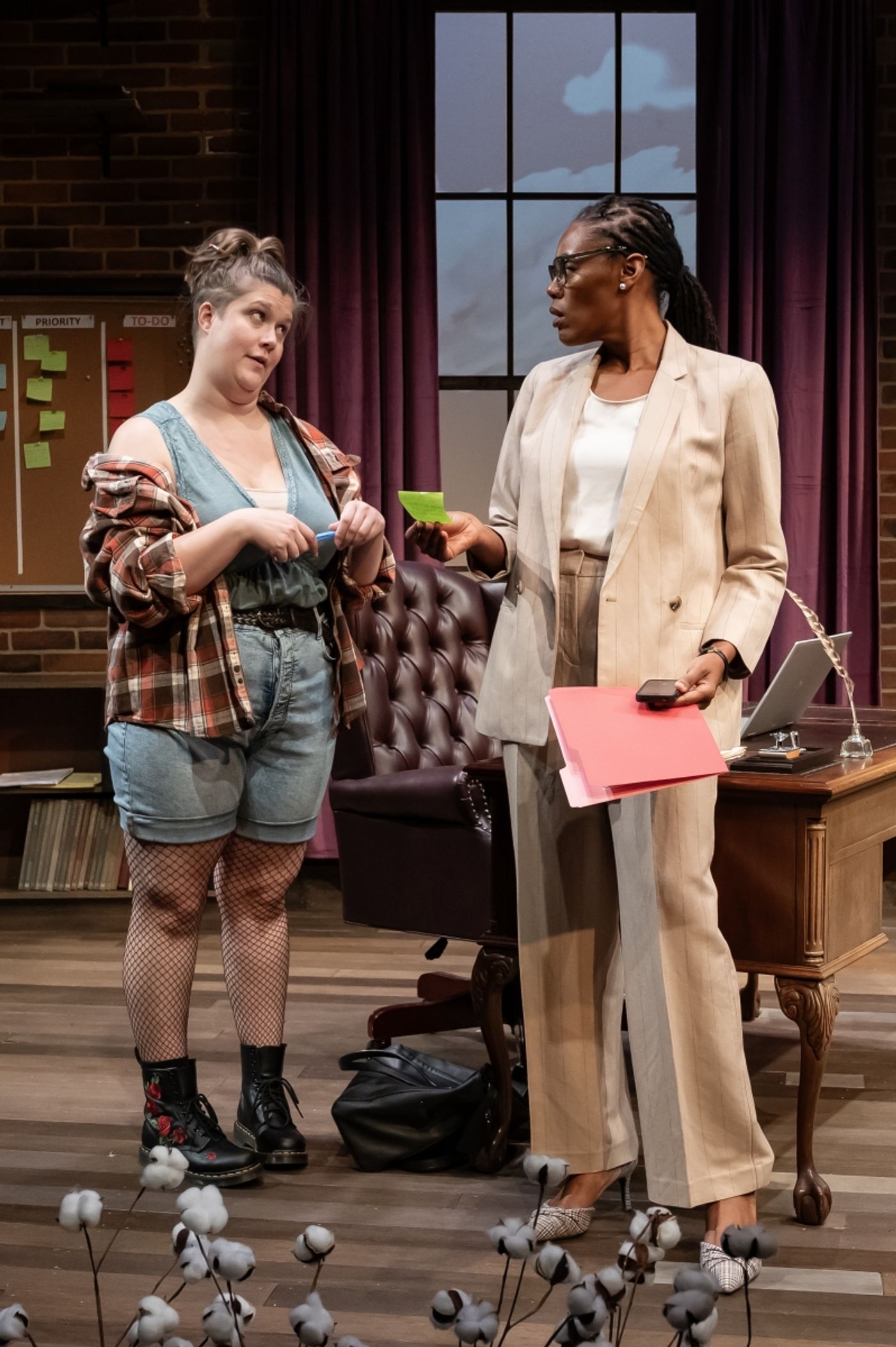Review: CONFEDERATES at Mosaic Theater Company
Regional Premiere of Dominique Morisseau's satirical look at race and freedom across time.


Photo by Chris Banks.
160 years separate the lives of Sara, an enslaved rebel turned Union spy, and Sandra, a tenured professor at a modern-day university. But in their struggles against oppression, Sara and Sandra have a lot in common. In the century and a half between them, what has changed and what obstacles remain firmly entrenched?
Confederates, by MacArthur “genius” fellow and two-time Tony-nominated playwright Dominique Morisseau is a smart and moving satire about the struggles of two formidable women who must stand up to subjugation as they consider whom they can trust and how they move forward. In the sure hands of director Stori Ayers, the powerful Mosaic Theater production connects us to the adversities and absurdities these two Black American women face.
We meet Sandra (Nikkole Salter), a political science professor at a predominantly white college, as she discovers an offensive photoshopped image of her face merged with an enslaved 19th century wet-nurse posted on her office door. Sandra is confused and disturbed, not knowing who placed the picture and who is a true ally. In Salter’s sure portrayal, Sandra is strong and poised, yet we see her vulnerability, isolation and the cracks in her façade.
In Confederates scenes morph from one era to another as we transition back and forth through time. As soon as we’ve met Sandra, we are whisked back to the Civil War-era South.
When we first see Sara (Deirdre Staples) she is sewing the flesh of her injured brother Abner, a runaway slave and Union volunteer. The wise and perceptive Sara is eager to learn how to use Abner’s gun to ensure her own safety. Deirdre Staples brings great strength and verve to the role.
.jpg?format=auto&width=1400)
Photo by Chris Banks.
Actors seamlessly shed or add costume pieces as they alter from one character and time period to another. Most are double-cast in a contemporary and historic role. Abner (Joel Ashur) takes off a cap and adds a shirt and necklace to transition from the hidden Union soldier to become Malik, one of Sandra’s brilliant students who disputes his grade and alleges bias. Asher brings us two distinct characters – a scared but committed runaway and a smart, charismatic and challenging student.
Caro Dubberly toggles between the spoiled Missy Sue, who fancies herself an abolitionist, and the over-sharing, over-the-top, overly “helpful” student assistant, Candice. Dubberly adds a manic energy and slippery slyness to both roles.
Tamieka Chavis, who joined the cast recently and had only been through the show twice by press opening, brought tremendous authority and appeal to her roles as Luanne, who is making the most of her relationship with the plantation’s owner, and Jade, the only other Black woman professor in the department, who is seeking the support she needs to secure tenure. Chavis was quite solid in her performance and promises to only grow in strength and assurance as the production’s run continues.
As we move back and forth across time, Confederates exposes the enduring biases of race, class and gender and clashes of choice, experience and opportunity. Here, “peculiar institution” refers not only to slavery in the antebellum South but to contemporary institutional biases found from corporate America to higher education.
“For me, this play is about liberation,” says director Stori Ayers. “Liberation is the act of setting someone free from imprisonment, slavery or oppression. Confederates is a freedom story.”
Nadir Bey’s inventive scenic design unites these two worlds by integrating weathered wood, brick and cotton throughout a flexible divided stage that merges the modern and historic worlds. Clever tweaks – a projection covering a photo, a corkboard that spins to reveal a map – move us from one world to another. John D. Alexander’s lighting – ranging from dark and moody to an institutional wash – works effectively with the scenic design. Moyenda Kulemeka’s costume design centers us firmly in each world yet she uses color – especially the vivid pinks of the final scene – to unite the characters across time. David Lamont Wilson’s sound design places us in time, such as his use of work songs at the top of the show. Deb Thomas’s prop design adds effective detail to both historic and modern worlds. Deja Collins is projection designer and Sierra Young is violence and intimacy choreographer.
Nikkole Salter as Sandra and Deidra Staples as Sara are the anchors of Confederates yet they don’t appear on stage together until the final moments. Both dressed in bright pink, united across time and in their battles against isolation, oppression, racism, sexism (and many more -isms), those brief moments together are vivid, affecting and incredibly powerful.
Confederates is a memorable production, expertly executed, that doles out humor and horror in equal measure and leaves you thinking long after leaving the theatre.
Runtime: 100 minutes with no intermission
CONFEDERATES by Dominique Morisseau, directed by Stori Ayres, is produced by Mosaic Theater Company. It runs through November 26 in the Sprenger Theatre at Atlas Performing Arts Center, 1333 H Street NE, Washington, DC 20002. Performances are Thursdays at 11 am; Thursdays and Fridays at 7 pm; Saturdays at 8 pm; and Sundays at 3 pm. For ticket purchases, Covid protocols, the post-show Reflection Series and other information, visit the Mosaic Theater website: https://mosaictheater.org/plays/2023-2024-confederates.
The production contains racialized language and discussions and depictions of slavery. A prop gun is used onstage, and there is a brief moment of nudity from the waist up.
Photo credit: Chris Banks
Reader Reviews
Videos

